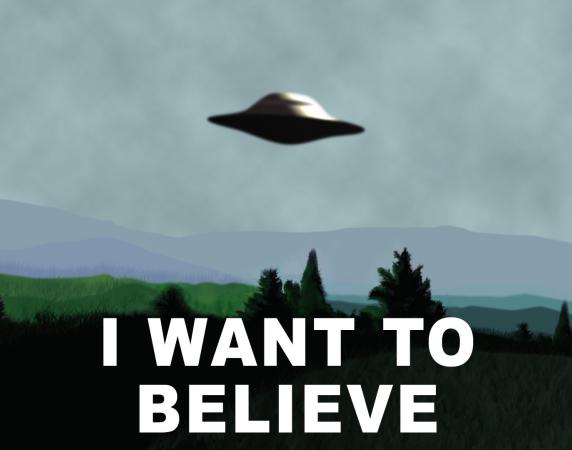
I want to believe
A few months ago, I gave a lecture at the New York Open Center on various aspects of the UFO subculture: New Age channelers, conspiracy theorists, nuts’n’bolts researchers. At one point I turned to the abductees, those tens of thousands of basically ordinary people who, possessing no less sound minds and bodies than the rest of us freaks, have a movie in their brains that shows them being taken aboard spacecraft by little gray dudes or other aliens, and frequently physically abused with needles, implants and anal probes.
I wanted to emphasize that abductees are neither mendacious nor simply delusional. Even the most rational explanations of their “experience” require a drastic revision of collective human psychology, but to really engage the phenomenon, one must dangle your toes over the edges of our maps of reality, and taunt the monsters that lurk there. Besides, abductee’s twilit encounters with the 20th century’s B-movie tricksters mark them so deeply — philosophically, psychologically and even physically — that to scoff away their reports smacks not only of only close-minded arrogance but of cruelty. These folks don’t huddle in recovery groups for nothing. In fact, I was going to show, abductees shed a strange, greenish light on the current (and frequently no less “fantastic”) mainstream mania about child abuse, for the abduction phenomenon crystallizes out of a similar stew of “screen memories,” trauma and the therapeutic construction of reality.
Well, that’s very nuanced and literary and all, but try telling it to someone who recalls an intergalactic metal claw up their butts the way you remember the day your dog died. Three abductees sat together at the Open Center that night, two white women and a black man. In respecting their perspective, I bent so far over backwards I nearly touched the ground, but my game of existential dodge-ball did not impress the ladies, and they soon fled in fury. But the dude stuck around, amused by my take and dying to tell the tale of the UFOs he saw land in East New York’s lovely Lincoln Terrace Park. Gradually he remembered that he had been meeting these ETs in the hood since childhood, and now he had videotapes and a huge book of scribblings and seals that looked like a blend of engineering diagrams and the sigils of ceremonial magic. And he had evidence of a cover-up as well: when he called to reported the sightings to the local network affiliates, CBS hung up the phone, ABC laughed in his face, and NBC put him on terminal hold. Then he called Fox. “They said they knew all about it, but didn’t care.”
Well, Fox actually seems to care quite a bit. Besides being first on the block to broadcast Christopher Walker’s eerie portrayal of Whitley Streiber in Communion, the network also carried Sightings, which served up stuff like space-shuttle UFO footage and an amazing come-back video of Sasquatch. While lacking the rich speculative verve of In Search Of…, Sightings‘s reliance on amateur documentation, anecdotal stories and fringe scientists made for fine tabloid science, and some have whispered that more insidious pressures than bad ratings forced Fox to cancel the show.
If that’s true, than the network’s really gonna get strong-armed for The X Files, which not only cops to the reality of the daring young Grays and their flying machines, but to a pervasive UFO cover-up as well. Don’t be fooled by the title: The X Files is not another tabloid reality show, but a wry, intelligent and creepy drama that could be TV’s most successful forage into paranormal folklore since the Night Stalker. But instead of Kolchack’s trench-coated reporter investigating ghosts and werewolves, here we have two agents of a far more reputable organ of authority than the Fourth Estate: the FBI. When the brilliant young FBI agent Fox Mulder begins to pay more attention to UFOs and strange weather patters than bank robbers and forgers, his creeped-out superiors assign snap skeptic Dana Scully to assist (and report on) his activities. So far, the duo have tracked three UFOs and two decidedly feral killers, but while “solving” most of the immediate cases, the mysterious forces they encounter never really see light, with hard evidence either elusive or squirreled away in Pentagon safes by, you know, them.
Besides penning tight and clever tales that shiver the spine, and spicing up the drama with dollops of rotten corpses, yellow bile, and burnt flesh, executive producer/writer Chris Carter knows his shit. But though he’s got the (mutilated) beef on Roswell, the Zeta Reticuli, and missing time, from what I can gather, most UFO buffs aren’t that impressed. Not only is The X Files “fantasy,” but the episodes aren’t even based on real cases — one buff insisted that the show’s focus on the FBI is misplaced because the bureau “is not involved.” But then, most UFO buffs cling to a dull literalism of mind, an obsession with hard evidence of actual extraterrestrial craft that invariably deadens them to the surreal poetry of it all. A “reality” show like Sightings reflects the pragmatic attitude of most hardcore buffs, but in the end The X Files‘ perpetual tease does a much better job of capturing what Mulder calls the “paranormal bouquet” of ufology’s folkloric science.
***
No media opens up the twilight zone between the quotidian and the fantastic better than TV — what other form lets space walks, Ex-Lax, and the Tasmanian Devil into your living room? In one X Files episode, the kid brother of an abductee stares the snow on a TV screen and transcribes reams of ones and zeros (there’s one reason not to get cable). When decrypted by an aghast National Security Agency, the kid’s digital communications contain classified military information, fractals, and Da Vinci diagrams. The subliminal message? Deeper patterns lurk beneath the (fictional) surface of the screen. As Vegas Luna, a pro-X-Files buff hanging out on a Usenet UFO newsgroup, put it, the show challenges you to “read between the lines…to connect the dots” — or the pixels.
The creed that closes The X Files credits says it all: “The Truth is Out There.” To wit: the phenomenon is not some interior, subjective dream, it’s out there, Sun Ra out there, outer limits out there. “When science and conventional wisdom no longer apply, might we turn to the fantastic?” Mulder asks, and the series answers, you betcha.
The foxy Mulder’s sustained attempt to open up his foxy partner’s mind not only eroticizes this tension between common sense and speculation, but nails a truth that most buffs completely miss: that the paranormal seduces you into seeking it. Playing clown to Scully’s straight (wo)man, Mulder could have ended up as just another wacky kook. But David Duchovny maintains a wonderful deadpan poise, as if he’s sensitive to ufology’s great catch-22: truth is paid for with an ever more pervasive paranoia. Drawn into Mulder’s point of view, we sense, like him, the massive intricacies of the apparatus of power that maintains consensus reality. But in the end, Mulder remains an ironic rationalist who, as the flying saucer poster in his cluttered basement office reads, “wants to believe.” (Mulder’s quest also reflects the recovery aspect of the UFO experience — it turns out that Mulder’s sister disappeared when they were kids, and hypnotic regression therapy brought back images of aliens stealing her away from their shared bedroom.)
If ufology has a politics, it lies in Mulder’s rabidly anti-authoritarian stance, a kind of ontological populism. Unlike many corporate institutions paraded as populist culture — rock music, baseball, Rush Limbaugh — ufology remains a people’s truth, despite the Hollywood prism most of us see it through. In The X Files, all the figures of official authority — local cops, other FBI agents, the NSA, the army — are total bastards, violently dismissive of ordinary citizens and profoundly undemocratic in spirit. Mulder gets his tips from waitresses and bikers, park rangers and bums, even a burn-out teen who mimics a UFO’s flight pattern with a hamburger.
Of course, to make an agenda of these truck-stop truths in the face of “common sense” and The New York Times is a good way to grease your brain for the slippery slope into a place in which all power — the Military-Industrial Complex, the University, the Fourth Estate — crystallizes into a vast conspiracy. But that’s the point: whether or not they’re real, the obsessions of ufologists are visionary symptoms of a state apparatus that in many ways cares nothing for the lives or concerns of ordinary citizens. When Mulder and Scully attempt to investigate dastardly alien deeds at Idaho’s Ellens Air Force Base, they come away with their hands empty and their asses kicked. The hidden message? That the best seat for UFO light-shows are alongside those barbed-wire fences that surround military bases. But if you slip through a hole in the fence, well, you’re on your own.




